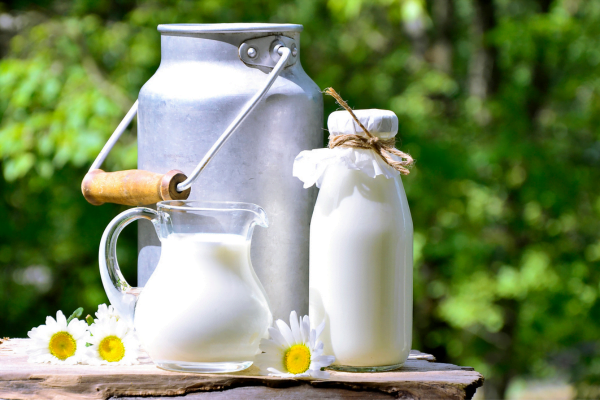Dairy encompasses milk of all mammals like cows, sheep, goats, camels and donkeys etc. The variation in nutritional composition varies from animal to animal in specific terms of lactose content, fat percentage and protein percentage etc. From childhood, children are conditioned to consume milk and most often it is cow or buffalo milk. Milk is rendered to be an important part of our daily diet owing to its nutritional properties. As times are changing, the conventional cow milk is being substituted or acting as an adjunct to other animal milk such as goat milk and camel milk. These mammal milk also offer better health benefits in comparison to cattle milk. The dairy industry is assurging due to the multivariate usage of mammal milk in food and beverage as well as the cosmetic and health sector.
Health benefits
- Boosts immunity – Immunity is the ability of the body to protect itself from infections and diseases.
Goat milk has the ability to support the immune system by increasing production of immunoglobulin, gut bacteria and eliminating disease causing agents such as bacteria and viruses. The naturally occurring antibodies in goat milk can help prevent tuberculosis. Other minerals such as selenium, chlorine and fluorine also help boost immunity. Selenium acts as an antioxidant while chlorine and fluorine act as germicide. Camel milk – Camel milk contains 2 important components namely
- Lactoferrin – It acts as an anti-inflammatory, anti-bacterial, antifungal and antioxidant properties. It contributes to the immunity boosting capacity of camel milk.
- Immunoglobulins – Immunoglobulins present are similar in structure but smaller when compared to human immunoglobulins. They easily identify disease causing agents and destroy it.
Benefits individuals with Autism Spectrum Disorder (ASD) – ASD is a neurodevelopmental disorder characterised by problems associated with socialisation and repetitive behaviour. Most children with AD are allergic to cow’s milk. Hence goat milk and camel milk can be good dairy substitutes. Cow’s milk contains both A1 and A2 beta casein. A1 Beta casein is considered to cause an inflammatory response especially in the case of autism. Goat milk exclusively contains A2 Beta casein and is void of A1 Beta casein. Individuals can easily switch to goat milk without any sensitive response. Opioid peptides are suspected to be the main cause of autism progression due to digestion of casein. Camel milk is lower in fat and lactose in comparison to cow’s milk and is rich in vitamins (Vitamin A,C,E) and minerals (magnesium, calcium, iron, zinc etc.) and has antioxidant benefits.
- Beneficial for diabetics – Diabetes is a condition caused by high glucose levels in blood. Insulin is produced by the pancreas while the liver is the main organ responsible for insulin response. Sufficient insulin levels can help improve blood glucose levels. Consumption of Goat milk helps improve insulin resistance, the key cause of diabetes. Products such as kefir made from goat milk can help diabetics by improving the ability of the body to utilise glucose. Camel milk on the other hand helps reduce blood glucose levels, insulin utilisation and serum lipid levels in individuals with type 1 diabetes mellitus. The optimal balance between blood glucose levels and Insulin levels in the body can also reduce dependency on insulin injections as well.
- Improves bone health – Bones protect organs, provide our body structure and store various important bone minerals (calcium, phosphorus, boron, zinc etc.). In naturopathy, cows are regarded to be “calcium animals” and goats “bio-organic sodium animals”. Goat milk contains medium chain triglycerides (MCT’s) present to help improve bone mineralisation and the bio-organic sodium present helps in prevention of arthritis and joint mobilisation. One cup of goat milk can provide 35% of a day’s calcium requirement. It also contains vitamin B2, vitamin B12 and potassium. Camel milk helps aid in essential growth and development. It can provide 10 times more calcium than cow’s milk. Consuming 120ml of camel milk everyday provides 5% of daily calcium requirement and 29% of vitamin B1.
- Boosts heart health – Goat milk is rich in potassium, which is essential for maintaining blood pressure and improves heart health. The presence of medium chain triglycerides (MCT’s), monounsaturated fatty acids (MUFA) and polyunsaturated fatty acids (PUFA) helps reduce LDL cholesterol levels in blood which is an influencing factor of atherosclerosis, stroke and heart attack. Camel milk contains MUFA in particular oleic acid which has health benefits similar to olive oil. Insulin-like proteins present also improve blood circulation. All these help keep the heart healthy.
- Helps achieve healthy and glowing skin – Naturally glowing skin is one that every individual longs for and tries to achieve. External use of goat and camel milk promotes skin health. Individuals suffering from various skin conditions like eczema, psoriasis etc. can benefit by using goat milk since it helps reduce itchiness and redness. Camel milk has the capacity to easily penetrate into skin. alpha-hydroxy acids (AHA) help to exfoliate dead cells and promote cell renewal. Lactic acid helps keep even sensitive skin supple and moisturised.
- It is hypoallergenic in nature – Individuals with lactose intolerance are sensitive to lactose present in cow’s milk and milk products. This is due to the inability of the body to digest milk sugar lactose, owing to deficiency of Lactase enzyme. Beta-lactoglobulin is responsible for cow milk allergy.
Symptoms of allergy include –
- Diarrhoea
- Vomiting
- Rhinitis
- Asthma
- Migraine etc.
40-100% of individuals with cow milk allergy can tolerate goat milk. It can also improve and boost gut health due to the presence of oligosaccharides and improve lactose maldigestion. Camel milk is a non-allergenic drink. It can also improve digestive abilities like goat milk. Though camel milk also contains Beta-casein, the structure is different in comparison to that of cow milk. This ensures improved allergy management among individuals.
Important points to note
- Goat milk is higher in fat and calories while camel milk is lower in fat and calories.
- Goat milk has a strong unique taste while camel milk has a milder, sweet and salty taste.
- It is expensive. Your location will decide the cost of milk. In some locations, goat milk is cheaper than camel milk while in other locations, camel milk will likely be more expensive.
- Goat milk is high in fat content and can raise blood cholesterol levels in some.
- Camel milk is high in terms of potassium levels while goat milk is high in purines and they may not be suited for individuals with kidney issues.
- There is still the possibility of the occurrence of allergies.
- Camel milk is not suitable for infants.
Camel and goat milk are now incorporated in a wide range of food products such as chocolates, milk powder, ghee, sweets, cookies etc. As consumers, we are spoiled for choice with a variety of food products and beauty products. The decision lies in our hands whether we would like to experiment with these new superfoods arising in the market but it is important to consult with your physician and nutritionist before incorporating any new food item in our daily diet and to understand its suitability and utility in our kitchens as well.
Mayuri,
Clinical Dietitian, Simplyweight





